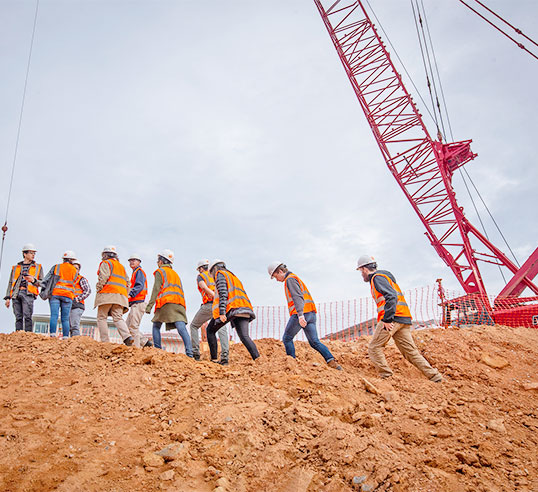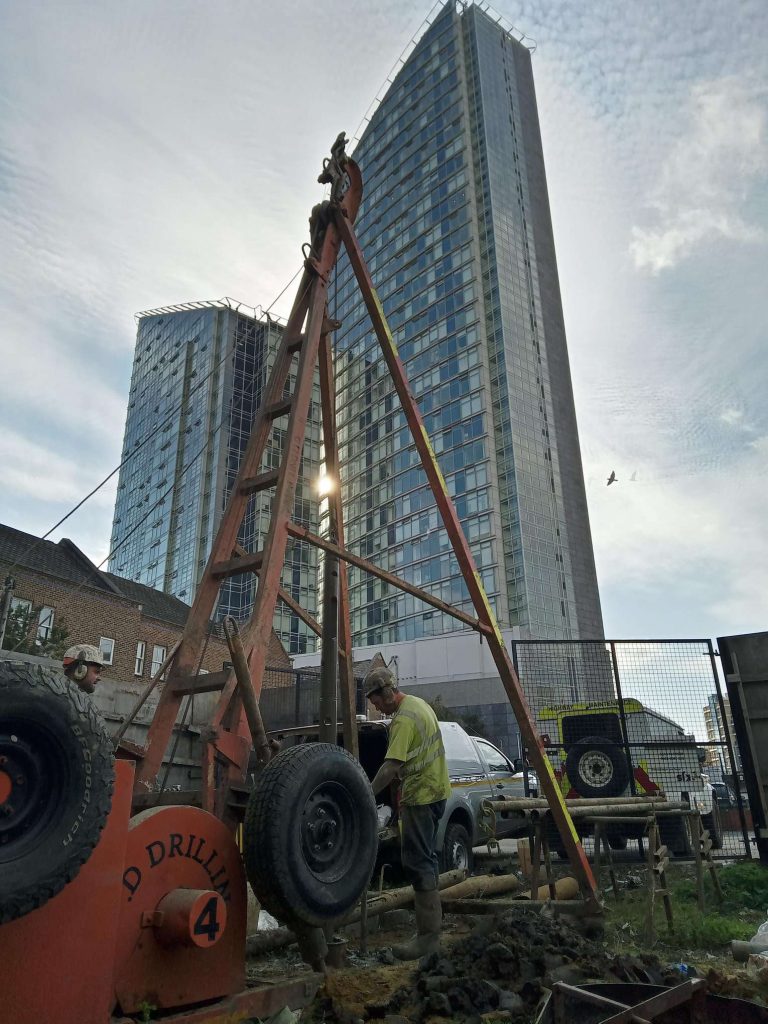Understanding the Comprehensive Role of Geotechnical Engineers in Ground Examination and Soil Evaluation for Building And Construction Tasks
Geotechnical engineers are integral to the success of building tasks, giving essential insights through extensive ground investigations and soil evaluation. Their proficiency in assessing dirt habits and using sophisticated screening methods notifies essential decisions that promote architectural stability and safety and security.
Role of Geotechnical Designers
The essential duty of geotechnical engineers in building and construction projects can not be overemphasized, as they give crucial insights right into dirt actions and site problems. These experts are charged with assessing the suitability of the ground for different kinds of structures, making sure security and stability throughout the construction procedure. Their competence includes a vast array of activities, including website characterization, soil tasting, and lab testing, which are critical for determining the physical and mechanical properties of the soil.
Geotechnical designers utilize their searchings for to develop fundamental designs that accommodate load-bearing requirements and mitigate threats associated to soil liquefaction, slope, and negotiation stability. They play an important function in determining prospective dangers, such as groundwater fluctuations and contamination, which can dramatically influence project stability. They work together with designers, civil designers, and professionals to make certain that geotechnical factors to consider are incorporated into the total layout and building phases.
Ground Investigation Techniques
Ground investigation techniques develop the foundation of geotechnical engineering, enabling designers to acquire a comprehensive understanding of subsurface conditions. These strategies are essential for analyzing dirt properties, determining groundwater degrees, and recognizing potential geological threats.
Common approaches consist of borehole drilling, which enables for the extraction of dirt samples at various depths, providing important information for analysis. In addition, sitting screening techniques, such as Standard Infiltration Tests (SPT) and Cone Infiltration Tests (CPT), are utilized to examine soil toughness and thickness directly in the ground.
Geophysical methods likewise play a significant role in ground investigations. Strategies such as seismic surveys and electrical resistivity tomography aid assess subsurface characteristics without comprehensive excavation. geotechnical eng. These non-invasive methods are particularly useful in delicate or big locations where disturbance need to be decreased
Furthermore, exploratory trenches can be excavated to aesthetically evaluate soil layers and identify any kind of abnormalities. Each of these methods adds unique insights, enabling geotechnical engineers to establish precise website analyses and educate style decisions. In recap, a combination of these ground examination techniques is crucial for successful building projects, making certain security and structural integrity.
Soil Evaluation Techniques
Dirt evaluation methods are essential for recognizing the chemical and physical homes of dirt, which straight influence the layout and construction of foundations and various other frameworks. Various techniques are employed to assess dirt features, guaranteeing that geotechnical designers get precise information for notified decision-making.
One generally used method is grain size evaluation, which figures out the distribution of particle dimensions within a soil sample. This is essential for categorizing soil types and anticipating their actions under tons. An additional necessary technique is Atterberg limitations screening, which assesses the plasticity and dampness web content of fine-grained dirts, giving understandings right into their design buildings.

Field tests, such as Basic Penetration Examinations (SPT) and Cone Infiltration Tests (CPT), offer useful in-situ data concerning soil strength and stratification. Collectively, these dirt analysis techniques develop the foundation of geotechnical examination, enabling engineers to make efficient and risk-free structures customized to the details problems of the site.
Threat Mitigation Techniques
Carrying out reliable threat reduction methods is essential for geotechnical engineers to deal with potential obstacles in building jobs. These methods are crucial in identifying, assessing, and handling dangers connected with soil problems, site security, click now and groundwater variations, which can negatively pop over here influence project end results.
One key method includes conducting complete website examinations that utilize innovative geophysical strategies and comprehensive soil sampling. By acquiring precise information on subsurface conditions, engineers can make informed choices on design and construction techniques. In addition, utilizing predictive modeling devices permits the simulation of numerous circumstances, enabling designers to anticipate potential troubles and carry out preventative procedures.
Additionally, establishing clear interaction networks amongst task stakeholders fosters a collective method to take the chance of administration. Regular updates and assessments guarantee that all events recognize the progressing site problems and can adjust their approaches as necessary.

Impact on Construction Tasks
The performance of threat reduction methods straight affects the general success of building jobs. Geotechnical engineers play an essential function in this domain name, as their competence in ground examination and dirt evaluation educates essential choices throughout the building and construction procedure. By properly analyzing dirt problems and determining prospective dangers, these specialists allow task teams to devise effective options that reduce risks connected with ground instability, water infiltration, and other geotechnical challenges.
The effect of extensive geotechnical analysis appears in numerous aspects of building and construction jobs, including price management, job timelines, and architectural stability. Early identification of problems enables prompt interventions, decreasing expensive hold-ups and budget plan overruns. An extensive understanding of site conditions improves the style and engineering procedure, making sure that frameworks are constructed to endure environmental stress and potential natural disasters.
Inevitably, the payments of geotechnical engineers are important to the successful implementation of building projects. Their job not just promotes security and compliance with regulations but also boosts the lasting sustainability of structures, making sure that they carry out effectively throughout their intended life-span. The partnership between various other stakeholders check my site and geotechnical teams is crucial for accomplishing optimum results in construction endeavors.
Final Thought
To conclude, geotechnical engineers execute an important feature in building jobs via thorough ground examinations and dirt evaluations. Their know-how in examining dirt behavior, using various investigation techniques, and carrying out risk mitigation approaches dramatically contributes to the architectural stability and security of developed environments. By working together with multidisciplinary groups, these specialists enhance task performance and ensure conformity with security standards, ultimately leading to effective construction outcomes and lowered prospective dangers.
Geotechnical designers are essential to the success of building projects, giving essential insights via thorough ground examinations and soil evaluation.The crucial function of geotechnical designers in building projects can not be overemphasized, as they offer vital insights right into dirt behavior and website conditions. Their competence encompasses a vast range of tasks, including website characterization, dirt tasting, and laboratory testing, which are critical for identifying the physical and mechanical residential or commercial properties of the dirt.
By precisely evaluating dirt conditions and recognizing potential hazards, these professionals allow task groups to create efficient solutions that lower dangers connected with ground instability, water infiltration, and various other geotechnical challenges.
In conclusion, geotechnical designers execute an important feature in construction tasks via thorough ground examinations and dirt evaluations.